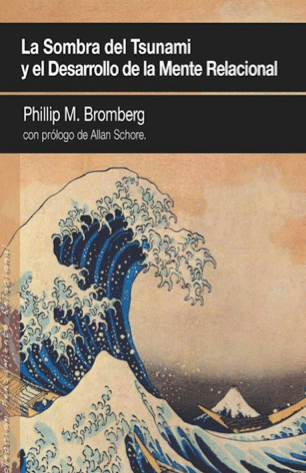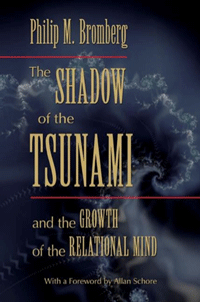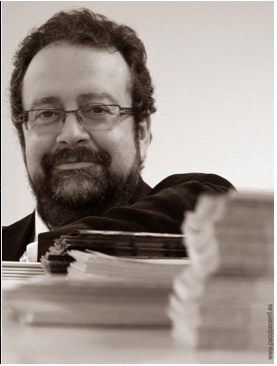Book Announcement by Carlos Rodríguez Sutil (Spain)
(click here for English)
Philip M. Bromberg, cuyo pensamiento ha tenido gran influencia en el psicoanálisis contemporáneo en EE.UU. (Howell, 2005, 102) afirmaba en una presentación realizada en enero de 2013, durante la reunión anual de la American Psychoanalytic Association, que su último libro (The Shadow of the Tsunami) refleja mejor que los dos anteriores su profunda creencia en que el psicoanálisis es más efectivo como psicoterapia cuando facilita la negociación de la “alteridad” (“otherness”), la alteridad que existe tanto en las otras personas como en otras partes de uno mismo. El psicoanálisis cumple dos objetivos de forma simultánea: por una parte, valida los estados del self como partes necesarias, aunque individuales, de la totalidad, por otra libera la creatividad de dichos estados para participar en el crecimiento de la personalidad, en un sentido relacional, tanto en el mundo interno como en el externo.
 La traducción de este libro ha sido realizada por un grupo de profesionales, GRITA (Grupo de Investigación de la Técnica Analítica), interesados en la profundización en el pensamiento relacional y en su difusión. El grupo fue fundado en 1989, por Alejandro Ávila Espada. Durante estos años nos hemos ocupado en el estudio de una amplia variedad de contribuciones: Independientes británicos, Neo-Kleinianos, Psicología del Self, Relacionales, Intersubjetivos, entre otras vertientes. Igualmente hemos desarrollado una obra colectiva que se plasma en una serie de artículos dedicados a la técnica (o “no-técnica”) y, también, a la traducción de artículos y libros destacados dentro de la historia del psicoanálisis relacional, como ha sido Influencia y Autonomía en Psicoanálisis, de Stephen A. Mitchell, que apareció en 2015, entre otros.
La traducción de este libro ha sido realizada por un grupo de profesionales, GRITA (Grupo de Investigación de la Técnica Analítica), interesados en la profundización en el pensamiento relacional y en su difusión. El grupo fue fundado en 1989, por Alejandro Ávila Espada. Durante estos años nos hemos ocupado en el estudio de una amplia variedad de contribuciones: Independientes británicos, Neo-Kleinianos, Psicología del Self, Relacionales, Intersubjetivos, entre otras vertientes. Igualmente hemos desarrollado una obra colectiva que se plasma en una serie de artículos dedicados a la técnica (o “no-técnica”) y, también, a la traducción de artículos y libros destacados dentro de la historia del psicoanálisis relacional, como ha sido Influencia y Autonomía en Psicoanálisis, de Stephen A. Mitchell, que apareció en 2015, entre otros.
Existen numerosas razones para elegir una obra de Philip Bromberg. En primer lugar, su gran relevancia en la historia reciente del psicoanálisis relacional, dentro de la tradición del William Alanson White Institute, cuyos fundadores fueron Erich Fromm, Harry S. Sullivan, Clara Thomson, y Frieda Fromm-Reichmann, y que cuenta con autores de la talla de Edgar Levenson (supervisor y gran amigo de Bromberg), Stephen Mitchell—con quien Bromberg colaboró personalmente—Margaret Crastnopol o Donnel Stern, por citar algunos nombres, que constituyen lo que se podría considerar a grandes rasgos la “Escuela de la Costa Este” del psicoanálisis relacional.
En segundo lugar, Bromberg ocupa ese lugar prominente que le reconocemos por la importancia de su indagación clínica sobre los mecanismos que permiten mantener la coherencia del self, como es la disociación, ante el trauma evolutivo (el “tsunami”), o esa otra forma de disociación compartida que se representa con el concepto “técnico” del enactment; indagación en la que sintetiza y enriquece gran parte de las aportaciones contemporáneas del psicoanálisis relacional e intersubjetivo y de la teoría de la mentalización de Fonagy. Espacio especial ocupa en su labor la obra de Donald Winnicott, uno de nuestros autores más venerados.
En tercer lugar, queríamos subrayar la brillante y original integración que realiza Bromberg en su comprensión de los mecanismos psicológicos y la interacción humana con las bases neurofisiológicas y cerebrales, en diálogo continuado con su colega Allan Shore, autor de uno de los prefacios. Finalmente, el esfuerzo realizado en esta traducción se justifica por la gran escasez de sus textos disponibles en español.
Carlos Rodríguez Sutil (Coordinador de la Traducción)
Link: https://www.psicoterapiarelacional.es/publicaciones/La-sombra-del-tsunami
 Carlos Rodríguez Sutil
Carlos Rodríguez Sutil
Doctor en Psicología, Psicoterapeuta
Ágora Relacional
Alberto Aguilera, 10 – Escalera Izqda.- 1º
28015-MADRID (ESPAÑA)
Email Carlos Rodríguez Sutil
The Shadow of the Tsunami: Spanish Translation
(clic aquí para el español)
Philip M. Bromberg, whose thinking has had great influence on contemporary psychoanalysis in the USA (Howell, 2005, p. 102), stated in his January 2013 presentation at the annual meeting of the American Psychoanalytic Association that his latest book (The Shadow of the Tsunami) reflects better than the previous two his deep belief that psychoanalysis is most effective as psychotherapy when it facilitates the negotiation of “otherness,” the alterity that exists in other people as well as in other parts of oneself. Psychoanalysis meets two objectives simultaneously: it validates the states of the self as necessary, although individual, parts of the totality, and also frees the creativity of those states to participate in the growth of the personality, in a relational sense, both in the internal and external world.
 The translation of this book has been carried out by a group of professionals, GRITA (Research Group of the Analytical Technique), interested in enhancing relational thinking and its dissemination. The group was founded in 1989 by Alejandro Ávila Espada. During these years we have been studying a wide variety of psychoanalytic contributors: British Independents, Neo-Kleinians, Self Psychologists, Relationalists, and Intersubjectivists, among others. Likewise, we have developed a collective work that is reflected in a series of papers devoted to technical (or “non-technical”) issues and also to the translation of relevant articles and books in the history of relational psychoanalysis, such as Stephen A. Mitchell’s Influence and Autonomy in Psychoanalysis, which appeared in 2015, among others.
The translation of this book has been carried out by a group of professionals, GRITA (Research Group of the Analytical Technique), interested in enhancing relational thinking and its dissemination. The group was founded in 1989 by Alejandro Ávila Espada. During these years we have been studying a wide variety of psychoanalytic contributors: British Independents, Neo-Kleinians, Self Psychologists, Relationalists, and Intersubjectivists, among others. Likewise, we have developed a collective work that is reflected in a series of papers devoted to technical (or “non-technical”) issues and also to the translation of relevant articles and books in the history of relational psychoanalysis, such as Stephen A. Mitchell’s Influence and Autonomy in Psychoanalysis, which appeared in 2015, among others.
There are many reasons to choose a work by Philip Bromberg. The first is because of its great relevance in the recent history of relational psychoanalysis, within the tradition of the William Alanson White Institute, whose founders were Erich Fromm, Harry S. Sullivan, Clara Thomson and Frieda Fromm-Reichmann, and which includes authors such as Edgar Levenson (supervisor and great friend of Bromberg), Stephen Mitchell—with whom Bromberg personally collaborated—Margaret Crastnopol, and Donnel Stern, to name a few, who constitute what could be broadly considered the “East Coast School” of relational psychoanalysis.
Second, we recognize the prominent place Bromberg occupies for his important contributions regarding the mechanisms for maintaining the coherence of the self, dissociation to cope with developmental trauma (the “tsunami”), and that form of shared dissociation represented by the technical concept of enactment. In his writing Bromberg synthesizes and enriches much of the contemporary contributions of relational and intersubjective psychoanalysis, as well as Fonagy’s theory of mentalization. His writing includes a special emphasis on the work of Donald Winnicott, one of our most revered authors.
Third, we wanted to underline Bromberg’s brilliant and original integration of psychological mechanisms and human interaction with neuroscience research, in a continuous dialogue with his colleague Allan Shore, author also of one of the prefaces. Finally, our efforts in this translation was inspired by the great shortage of Bromberg’s texts available in Spanish.
Carlos Rodríguez Sutil (Translation Coordinator)
Link: https://www.psicoterapiarelacional.es/publicaciones/La-sombra-del-tsunami
 Carlos Rodríguez Sutil
Carlos Rodríguez Sutil
Doctor en Psicología, Psicoterapeuta
Ágora Relacional
Alberto Aguilera, 10 – Escalera Izqda.- 1º
28015-MADRID (ESPAÑA)
Email Carlos Rodríguez Sutil



